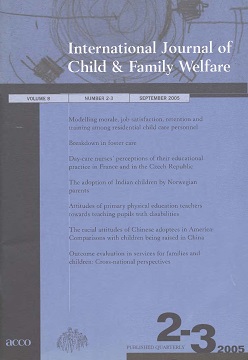Modelling morale, job satisfaction, retention and training among residential child care personnel
Keywords:
residential child care personnelAbstract
This paper examines morale, job-satisfaction, retention, training and working environment among residential child care personnel. The majority reported satisfactory levels of morale and job satisfaction and planned to remain in residential group care work. However, sizeable minorities reported low morale, were dissatisfied with their jobs and intended to leave residential work. Whilst most had completed or were undertaking the relevant National Vocational Qualification, few held recognised professional qualifications. Scales used to measure six dimensions of working environment were found to have good reliability. The overall distribution of scores relating to each scale indicated that the child-care staff generally held positive perceptions of their working environments. Logistic regression analyses were undertaken with morale, job satisfaction, retention and qualifying training as dependent variables, and the six scales of working environment as the main predictor variables. Overall, 82.3% of predictions for morale status were accurate, as were 83.7% of predictions relating to job satisfaction, 73% of predictions concerned with whether care staff planned to remain in residential child-care work, 76.3% of predictions in respect of National Vocational Qualifications, and 91% of predictions for professional training status. The study was commissioned by the Social Education Trust and was carried out in collaboration with the National Children's Bureau.

